Book contents
- Frontmatter
- Introduction
- THE MODERNISTS
- THE NEW CRITICS
- THE CRITIC AND THE INSTITUTIONS OF CULTURE
- 14 Criticism and the academy
- 15 The critic and society, 1900–1950
- 16 The British ‘Man of Letters’ and the rise of the professional
- 17 F. R. Leavis
- 18 Lionel Trilling
- 19 Poet-critics
- 20 Criticism of Fiction
- Bibliography
- Index
- References
19 - Poet-critics
from THE CRITIC AND THE INSTITUTIONS OF CULTURE
Published online by Cambridge University Press: 28 March 2008
- Frontmatter
- Introduction
- THE MODERNISTS
- THE NEW CRITICS
- THE CRITIC AND THE INSTITUTIONS OF CULTURE
- 14 Criticism and the academy
- 15 The critic and society, 1900–1950
- 16 The British ‘Man of Letters’ and the rise of the professional
- 17 F. R. Leavis
- 18 Lionel Trilling
- 19 Poet-critics
- 20 Criticism of Fiction
- Bibliography
- Index
- References
Summary
The early modern period is an age of poet-critics. At the turn of the twentieth century, as new schools and movements of poetry sprang up throughout Europe, the poets who created them also spread the word of a critical revolution. ‘Ladies and Gentlemen’, Stéphane Mallarmé told his Oxford and Cambridge audiences in 1894, ‘I am truly bringing news. Astonishing news. And never seen before. – We have been meddling with verse.’ Many later poets brought similar news. A flood of essays and lectures and position papers and manifestos accompanied each innovation in style. Indeed, in some cases, such as Marinetti's ‘Manifesto of Futurism’ (1909) or Breton's first Manifesto of Surrealism (1924), the manifesto may have been more influential than the verse it recommended. Nor were these documents merely the public relations or by-products of changes in poetry. Often they served as ‘gunsights’(Ezra Pound's word), forerunners of new composition. Thus Mikhail Kuzmin's Russian manifesto ‘On Beautiful Clarity’(1910) is important less for what it explains or defends than for pointing out critical directions to poets of the future: Gumilev, Akh-matova, Mandelstam. At such times the critic unites with the artist. This interpenetration of criticism and poetry, their mutual influence and vitality, helps to define the early modern period. The leading figures tend not to be poets only, or critics only, but genuine poet-critics.
What accounts for this alliance? Part of the answer may be that it was already long overdue. Poets had been among the best critics since ancient times, so ready to discuss their art that a history of criticism might be composed entirely from their statements. As practical critics, Horace and Dante and Keats have more to say about poems than do Plato, Aquinas, and Hegel.
- Type
- Chapter
- Information
- The Cambridge History of Literary Criticism , pp. 439 - 467Publisher: Cambridge University PressPrint publication year: 2000



